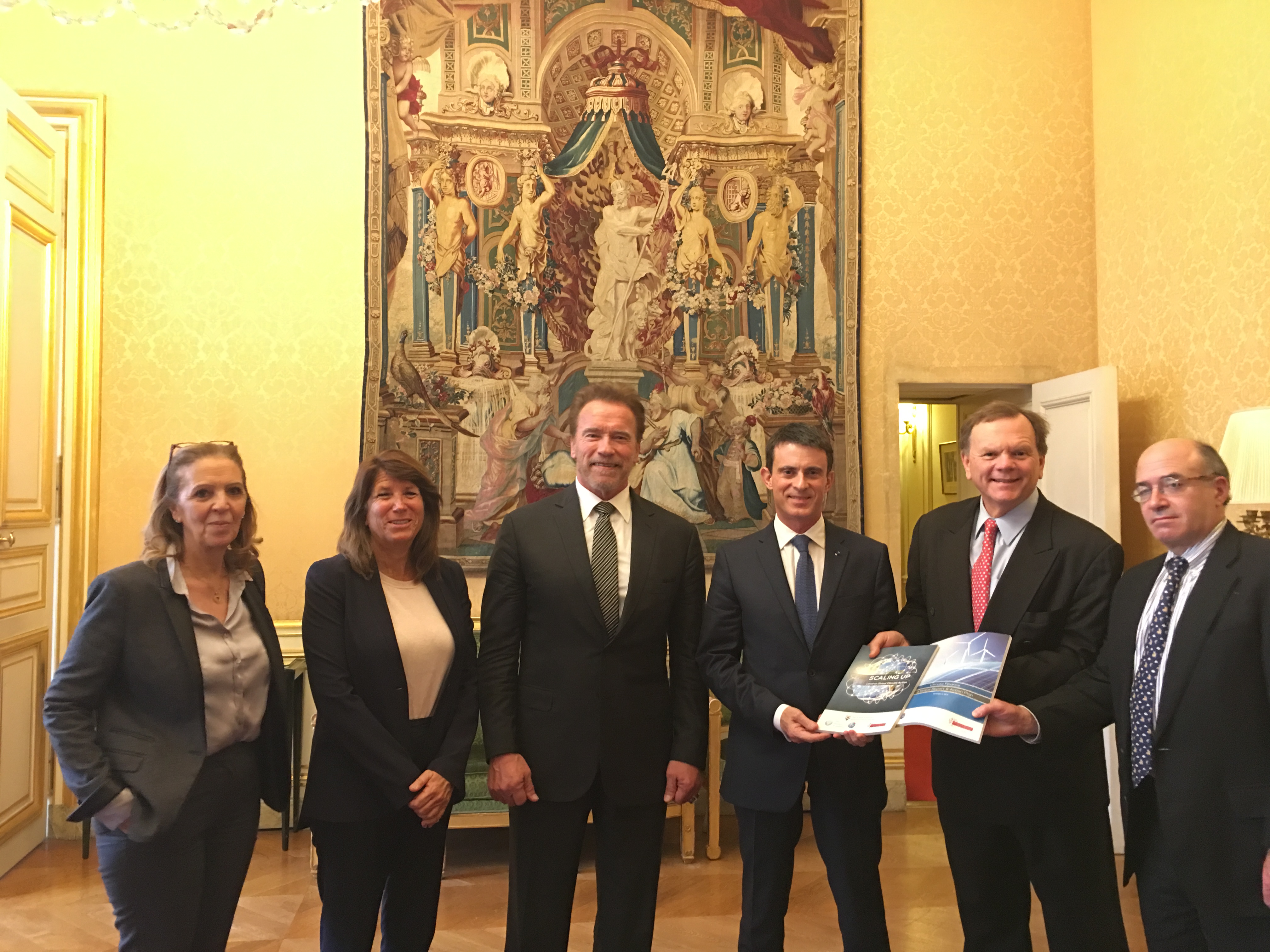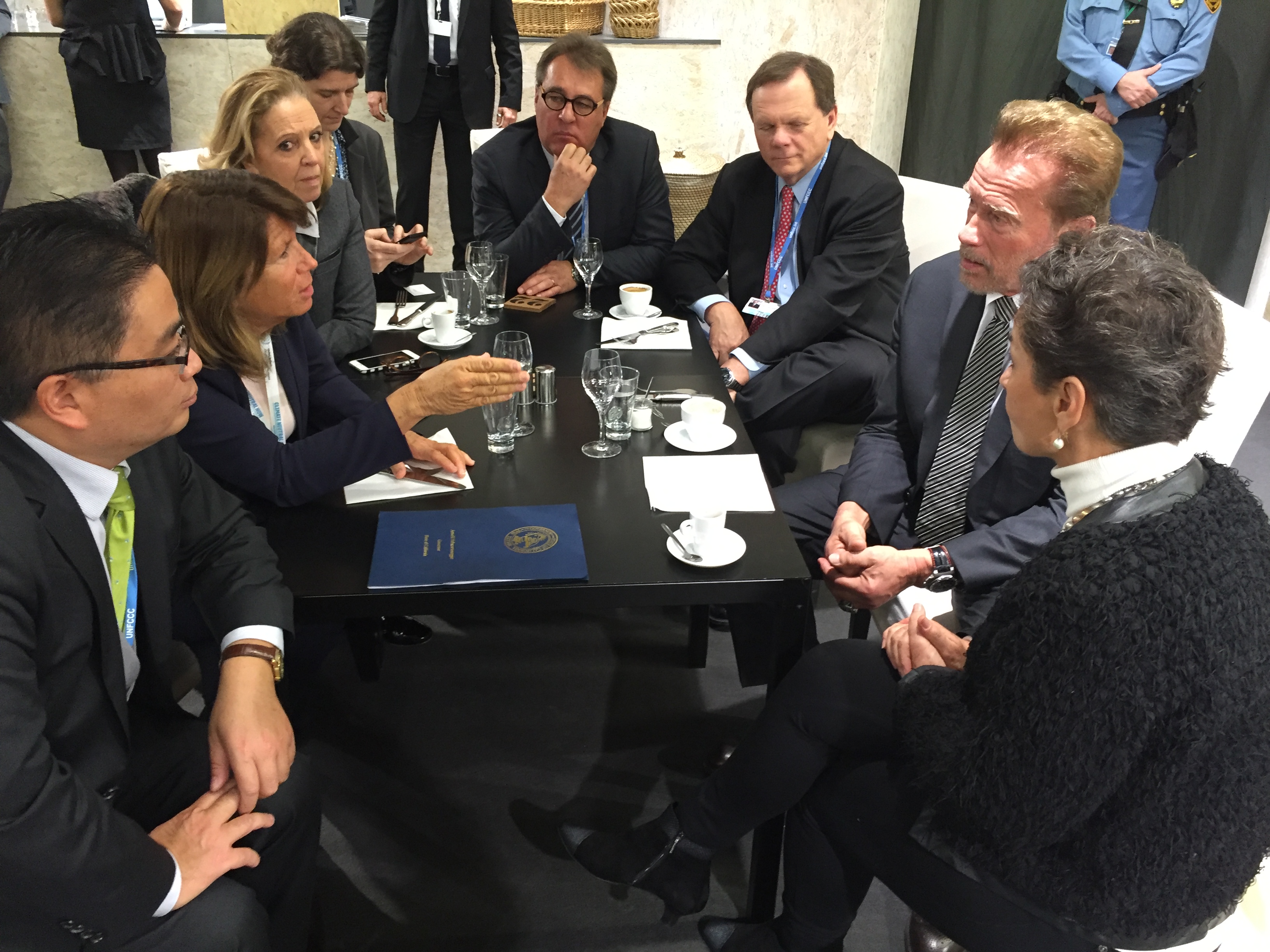With three days remaining for the COP21 to reach an accord, negotiators are working hard to overcome final obstacles being raised by some nations. Achieving consensus from the 195 nations participating in the COP21 is quite a challenge. If you can imagine any state or national governing body having 100% of their members agree on anything you can begin to understand the daunting challenge faced by summit negotiators.
Yet there is still a feeling of optimism among the lead negotiators here in Paris, and a sense of momentum. Governor Schwarzenegger with his USC Institute and R20 teams spent the day meeting with many of the key negotiators taking part in the climate summit. Governor Schwarzenegger received briefings on the status of the climate talks and guidance on how he can be helpful to their efforts.
In individual meetings with Todd Stern, the U.S. State Department’s lead negotiator, Xie Zhenhua, China’s lead negotiator, Laurent Fabius, French Foreign Minister & President of the COP21, and Christiana Figueres, Executive Secretary for the UN Framework Convention on Climate Change, we heard a consistent message. The remaining issues to be agreed upon are challenging but not insurmountable. Negotiations are now centered on the debate over whether the summit target should be to limit global warming to 2 degrees Celsius over pre-industrial levels by 2100 or a more ambitious goal of a 1.5 degree Celsius limit by the same date. According to the IPCC, increased global temperatures of more than 2 degrees Celsius would have serious consequences, such as an increased number and intensity of extreme climate events and serious health risks.
The other contentious issue dividing the summit is over how much wealthy nations should financially contribute to the renewable energy development in the developing world.
Minister Fabius explained the important role that private finance plays in this equation. He stressed that while public financial commitments are important they will be minimal in comparison to what the private sector can commit. Private equity investors, and large health and pension funds, like CalPERS and UC investment portfolio, are considered very significant actors. The R20 and USC Schwarzenegger Institute presented their report, “Climate Finance; A Status Report and Action Plan” to lead negotiators. The report examines how to overcome the financial obstacles to regional green projects and goes on to outline plans to create a $1 billion green tech accelerator fund. Commitments like this help produce political and psychological momentum needed in these final days of negotiations, according to UN’s Figueres and Minister Fabius.
Governor Schwarzenegger and the many regional leaders participating in the summit reiterated the importance of the bottom up approach being taken this year. They all helped provide more confidence to national delegates of their ability to achieve their targeted commitments without hurting their economies or job growth.
The China delegation is also helping increase the level of optimism at COP21 by making a very real commitment to move towards large scale renewable energy production. The Chinese are committed to reducing their emissions as well as introducing a cap and trade, similar to California’s. China is also interested in moving towards recognizing a uniform method of measuring GHG.
In media interviews Governor Schwarzenegger was frequently asked about China. He stressed the importance of not pointing fingers, especially since so many of the goods consumed by the U.S. and other nations are “made in China.” He equated our reliance on Chinese manufacturing to “emissions laundering.” Understanding global interconnectedness is an important element of this year’s climate summit.
Yesterday Beijing issued its first Red Alert as air pollution hit hazardous levels. This move has bolstered Chinese efforts to reach an agreement. This action is consistent with the message Governor Schwarzenegger has made to COP negotiators and journalists covering the event. Schwarzenegger regularly stresses the need to talk about climate change differently. To talk about it in terms that average citizens can relate to and which they find meaningful. While scientists and COP participants might understand and care about rising temperatures in 20 years, or the impact of rising sea level in 30 years, that message does not resonate with people and families who are worried about putting food on the table, health care, college tuition and other more immediate concerns. Explaining how air pollution kills 7 million people around the world each year or 19,000 people each day, is a much more effective way to reach people and inspire action. SEE SCHWARZENEGGER'S POST ON FACEBOOK
We saw this first hand in California when the 1960’s extreme air pollution and unhealthy smog levels led to aggressive clean air laws. We see a similar change happening in China now.
Dr. Stoknes stressed the importance of effectively communicating the problem in a way that connects with people and also explained the importance of having a positive story to share as well. The California delegation to COP is doing just that, by highlighting the technological innovations in cars, lighting , smart grids, smart homes, that have made California the renewable capitol of the United States and helped the State reduce pollution and emissions while also growing its economy and jobs at a rate that is outpacing the rest of U.S.
The stone age did not end because of a lack of stones. It ended because humans found a smarter, more efficient way of doing things. So too the age of fossil fuels will not end because we run out of fossil fuels but instead because we have come to understanding that there is a much smarter way of moving forward. There is a sense in Paris that the world is starting to look towards a smarter way to approach our future.
BuzzFeed – Schwarzenegger: It’s Time To Move Forward On Climate Change “Like A Terminator”



.jpg)
.jpg)
.jpg)